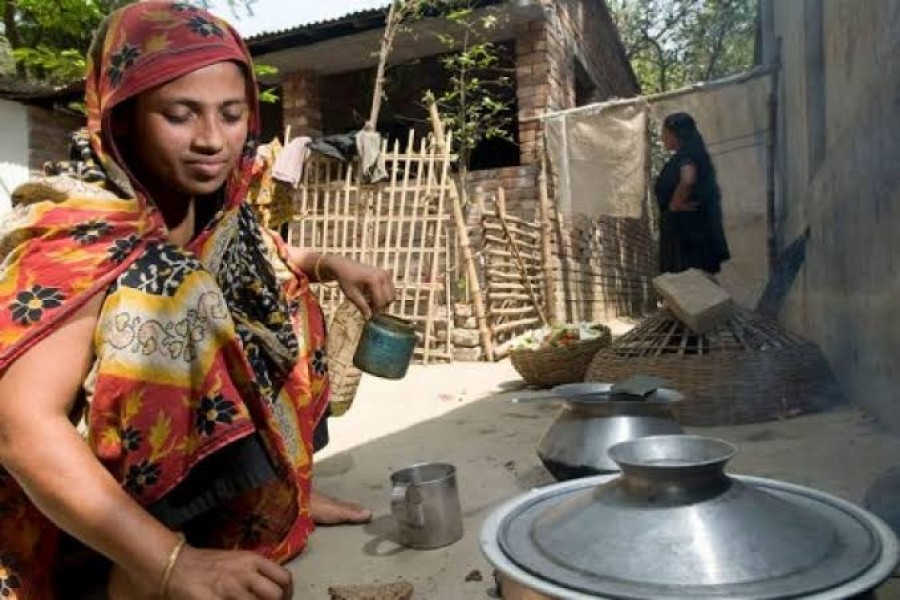Like on various occasions in the past, a regional body and a Bangladeshi rights group have focused on a critical issue involving the perennially deprived women of the country. The area of discussion was the recognition of the labour put in by the womenfolk in household and lots of other works. The two organisations have brought to light some revealing truths at a 'national dialogue' recently. In a joint study, they have discovered that unpaid and unaccounted domestic work comprises nearly 48 per cent of the nation's GDP (gross domestic product). As the study has found, women's contribution to the unaccounted labour market is more than 81 per cent. Understandably, this contribution continues to increase, as women in greater numbers are joining the unrecognised labour and economic sectors. They include women living in both rural and urban areas.
Women's condition in villages is worse, as the rural women and girls' work ranges from traditional kitchen-based and house-cleaning domestic work to helping the male family heads perform their post-harvest tasks like carrying crops home from boats or carts to the gruelling job of winnowing. Child rearing and feeding domestic cattle are the two other segments of their unpaid work. The educated and middle-class urban housewives, euphemistically termed homemakers, can manage to shirk some responsibilities. A most convenient way is keeping a domestic help. The ladies' chief area of work --- customarily unpaid and unaccounted, remains limited to looking after the studies of their children, or taking to or bringing them from school. In many houses, cooking cannot be avoided.
Compared to these economically privileged classes, the lower-strata or slum-dwelling women eventually emerge as unpaid, and at times neglected, assistants of their husbands. This is a normal spectacle still encountered throughout the country. Women compulsorily employed in unpaid domestic labour sector were the social norm in the past. In the 21st century when a number of them have taken attempts to break the status quo by engaging in income-generating ventures, most of the other women confined to the boundaries of their homesteads seem completely anachronistic. By spotlighting the issue, South Asian Network on Economic Modelling (SANEM) in collaboration with Manusher Jonno Foundation (MJF) tries to help Bangladeshi women become aware of their importance with a new self-esteem to top it up. Thus enable them to play an assertive role befitting the potentially valued half of the national population that they are. A major aspect of the study on women's unrecognised labour is the monetary value of the output in question by using the methodology under satellite accounts. The attempt is said to be the first of its kind in the country. Satellite accounts provide a framework linked to the central accounts enabling the relevant authorities' attention to be focused on a certain field of economic and social life in the context of national accounts.
The colloquium has quite aptly advocated the recognition of the women's unpaid, and thus undervalued, work through adopting right and meaningful policies. These nationally important policies should ensure that the dignity of one's being in the non-labour market increases in the GDP, with the national budget recognising it. Commensurate with the great importance of the issue, the dialogue was called 'Recognition of Women's Unaccounted Work in National GDP and Inclusion in Gender Responsive Budgeting.' As the whole proposal on women's unaccounted work aims to employ a carefully devised theoretical model, emphasis has been laid on average work hour, wages and the population concerned by taking into consideration satellite accounts. However, the theoretical aspects aside, the key to steps needed for an all-out improvement in women's economic position lies in mundane social realities.


